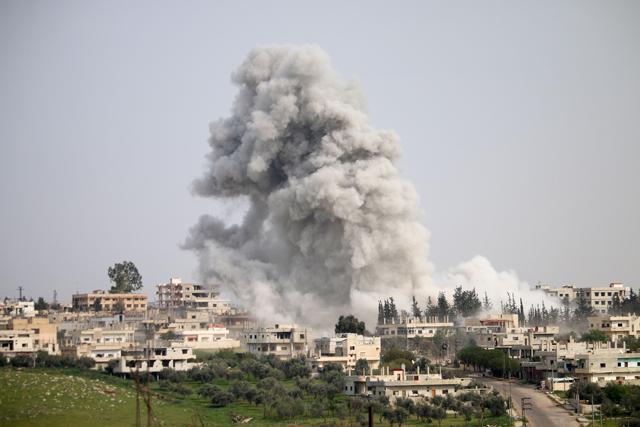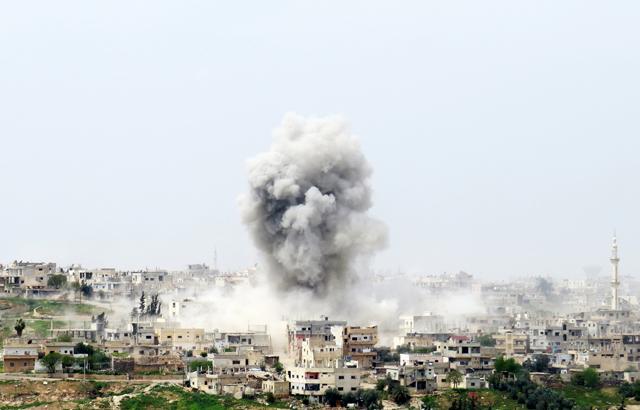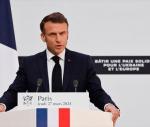You are here
Russia warns of serious consequences from US strike in Syria
By Reuters - Apr 08,2017 - Last updated at Apr 08,2017

Smoke billows following a reported air strike on a rebel-held area in the southern Syrian city of Daraa, on Saturday (AFP photo)
UNITED NATIONS/MOSCOW/BEIRUT — Russia warned on Friday that US cruise missile strikes on a Syrian airbase could have "extremely serious" consequences, as President Donald Trump's first major foray into a foreign conflict opened up a rift between Moscow and Washington.
The warships USS Porter and USS Ross in the Mediterranean Sea launched dozens of Tomahawk missiles at the Shayrat airbase, which the Pentagon says was involved in a chemical weapons attack this week.
It was Trump's biggest foreign policy decision since taking office in January and the kind of direct intervention in Syria's six-year-old civil war his predecessor Barack Obama avoided.
The strikes were in reaction to what Washington says was a poison gas attack by the government of Syrian President Bashar Assad that killed at least 70 people in rebel-held territory. Syria denies it carried out the attack.
They catapulted Washington into confrontation with Russia, which has advisers on the ground aiding its close ally Assad.
"We strongly condemn the illegitimate actions by the US The consequences of this for regional and international stability could be extremely serious," Russia's deputy UN envoy, Vladimir Safronkov, told a meeting of the UN Security Council on Friday.
Russian Prime Minister Dmitry Medvedev charged that the US strikes were one step away from clashing with Russia’s military.
US officials informed Russian forces ahead of the missile strikes and avoided hitting Russian personnel.
Satellite imagery suggests the base houses Russian special forces and helicopters, part of the Kremlin’s effort to help Assad fight Daesh and other militant groups.
Trump has frequently urged improved relations with Russia, strained under Obama over Syria, Ukraine and other issues, was hosting Chinese President Xi Jinping at his Mar-a-Lago resort in Florida on Thursday night when the attack occurred.
Treasury Secretary Steve Mnuchin, in Florida with Trump, said on Friday the United States would announce additional sanctions on Syria in the near future but offered no specifics.
Russia’s defence ministry responded to the attack by calling in the US military attache in Moscow to say that at midnight Moscow time (5pm EDT) it would close down a communications line used to avoid accidental clashes between Russian and US forces in Syria, Interfax new agency said. US warplanes frequently attack Daesh militants in Syria and come close to Russian forces.
‘Prepared to do more’
US ambassador to the United Nations Nikki Haley said on Friday the Trump administration was ready to take further steps if needed.
“We are prepared to do more, but we hope that will not be necessary,” she told the UN Security Council. “The United States will not stand by when chemical weapons are used. It is in our vital national security interest to prevent the spread and use of chemical weapons.”
Secretary of State Rex Tillerson, who also was in Florida with Trump and is scheduled to go to Moscow next week, said he was disappointed but not surprised by the Russian reaction because it showed continued support for Assad.
Iran, which supports Assad and has been criticised by Trump, condemned the strike, with President Hassan Rouhani saying it would bring “only destruction and danger to the region and the globe.”
US officials called the intervention a “one-off” intended to deter future chemical weapons attacks and not an expansion of the US role in the Syrian war.
US allies from Asia, Europe and the Middle East expressed support for the attack, if sometimes cautiously.
The action is likely to be interpreted as a signal to Russia, and countries such as North Korea, China and Iran where Trump has faced foreign policy tests early in his presidency, of his willingness to use force.
The United States is now likely to be more aggressive in pursuing intelligence about Syria’s suspected chemical weapons programme. The Pentagon has also signalled interest in determining any Russian complicity.
“At a minimum, the Russians failed to rein in the Syrian regime activity,” a senior US military official told reporters, speaking on condition of anonymity.
The official also said the United States had been unable to determine if a Russian or Syrian aircraft bombed a hospital that was treating victims of the chemical attack.
Related Articles
WASHINGTON — The United States has made slight adjustments to its military activities in Syria to strengthen protection of American forces f
WASHINGTON — The Pentagon believes the Syrian regime likely has additional chemical weapon stocks at the airfield struck by US missiles last
WASHINGTON — The Syrian government may be developing new types of chemical weapons, and US President Donald Trump is prepared to again order


















